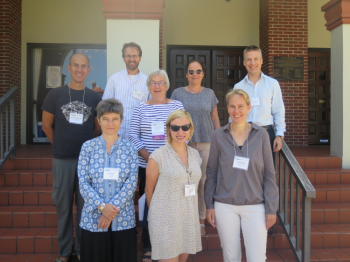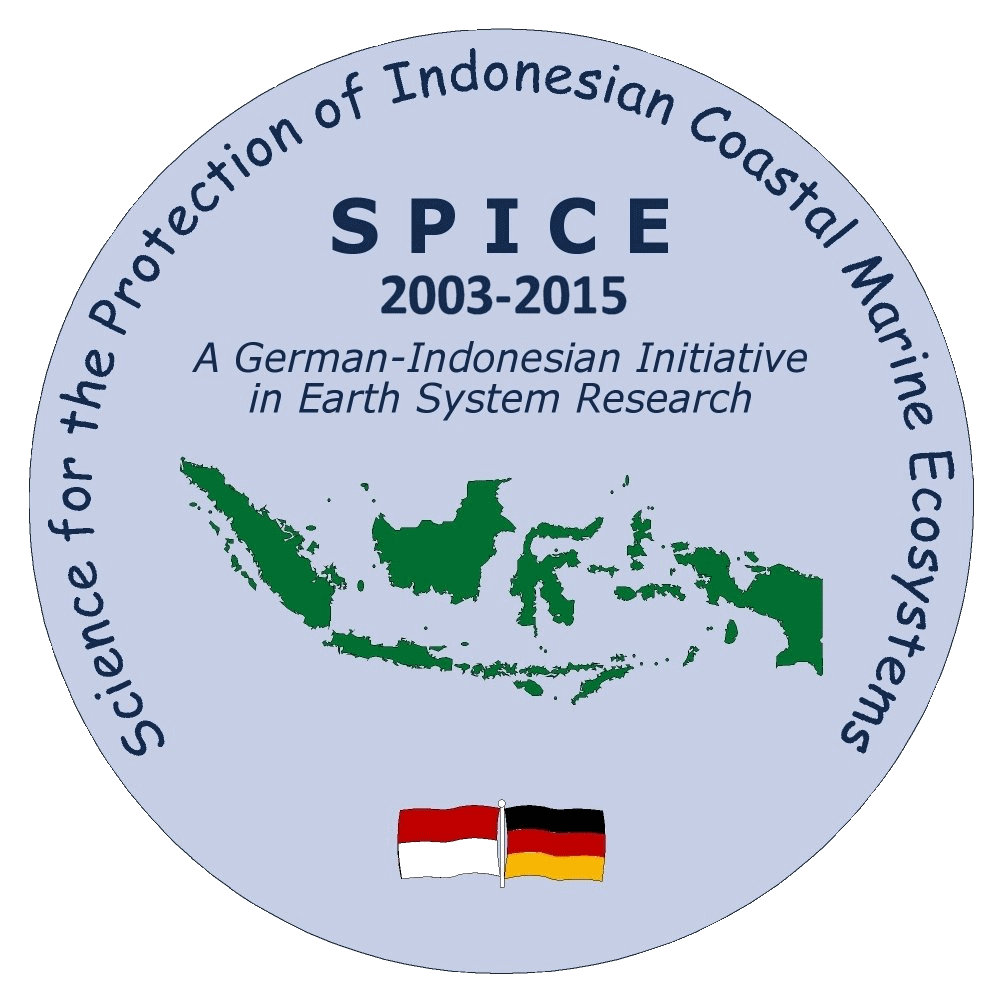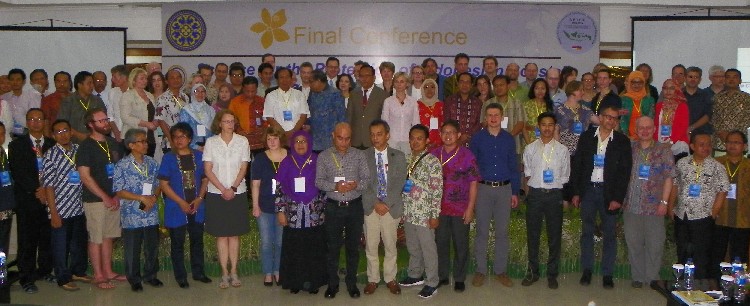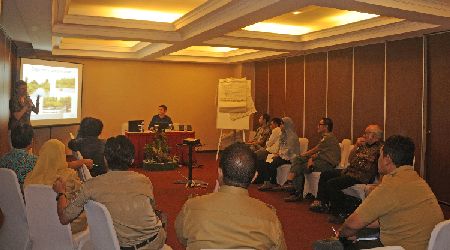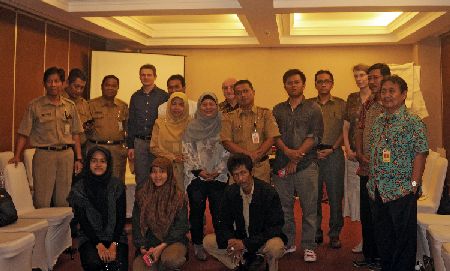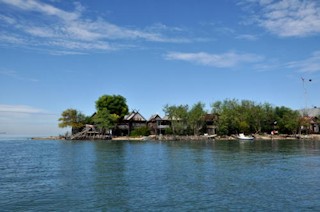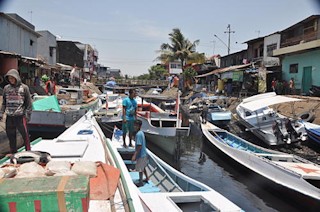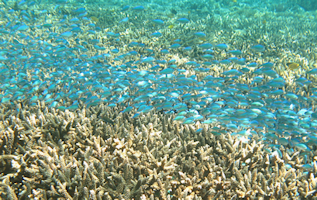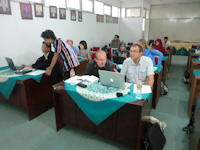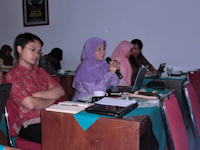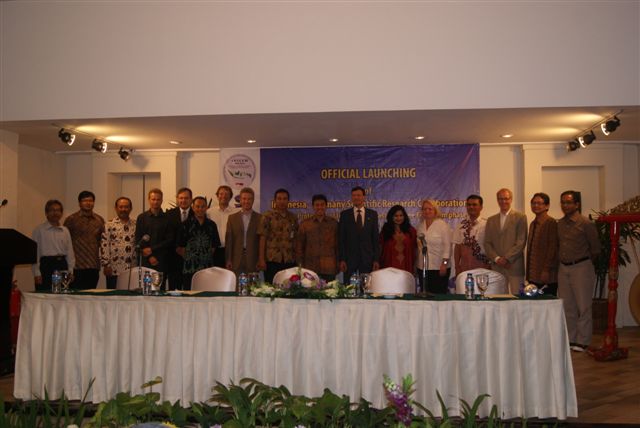|
After three phases of successful bilateral research cooperation in frame of the SPICE Program the results have been introduced during the final conference on 20 and 21 January 2016 at the UDAYANA University in Bali.
 PDF Conference Program PDF Conference Program
The meeting drew a temporary line under a very successful German-Indonesian cooperation in research and education within the marine sciences, which started in 2003. During the conference the program partners already discussed further opportunities for continued collaboration and joint research.
Scientists from 14 German and 12 Indonesian research institutions met at the Udayana University in Denpasar. The 150 conference participants were welcomed by Prof. Wayan Arthana, Dean of Faculty Ocean and Fisheries, and Prof. Made Damriyasa, Rector of the Udayana University.
On behalf of the Germany's Federal Ministry for Education and Research (BMBF) Andrea Heyn, Deputy Head of Division725 "System Earth", summarized the development of the BMBF-funded research program.
Prof. Indryono Soesilo, one of the founders of SPICE, reflected on the program's success and looked out on future research topics.
During the conference's four plenaries and five parallel sessions the scientific results from 12 years of successful bilateral SPICE cooperation were presented and discussed.
Abstracts
Following the meeting, which was very positively received by the parties involved, a group of scientists and stakeholders from Germany and Indonesia gathered to present their ideas for future joint research activities in the marine sciences.
Dr. Claudia Schultz, SPICE program coordinator said about the conference:
"It was very important for us to bring the ZMT-coordinated SPICE program to a successful end, but to also continue the good collaboration which has developed over the course of the many joint research projects. We have already come up with some promising starting points which are now in discussion."
Background
The Indonesian-German SPICE Program was initiated in 2003 by the bilateral Steering Committee on Earth and Ocean Science being implemented since then.
SPICE I (2003 -2007) provided significant information on the structure and functioning of coastal ecosystems, covering mangroves, coral reefs, coastal pelagic systems and peat swamps and on their alterations due to human interventions. Based on the information and experience gained in the first phase, the focus on natural sciences was complemented by social science during the second phase (2007-2010), aiming to better understand the social dimension of coastal ecosystem changes and to improve the links between research and decision making.
Following two phases of successful bilateral cooperation the research program has been continued in 2012. For the third SPICE phase six interdisciplinary research topics were jointly agreed by the German and Indonesian research teams. In some of the topics the research, which formed the basis of the SPICE Program during the first two phases, has been enhanced on a wider approach, some alignments like potentials for renewable energies and natural and anthropogenic induced environmental changes during the past 4,000 years have been newly affiliated according to their actual relevance in Indonesia. Social sciences and capacity building are cross cutting tasks in each topic.
The research activities within the SPICE Program were accompanied by actions towards building capacity and infrastructure for marine research and development. Scientists and students from Indonesia and Germany participated in the research activities to pursue graduate and postgraduate degrees in marine science. Trainings, seminars and workshops were organized as an accompanying measure within the program.
|
Science-Policy Workshop in Cilacap and seminars at Universitas Gadjah Mada in Yogyakarta, Indonesia
12 January and 14-15 January 2016
Jill Heyde and Martin C. Lukas conducted a science-policy workshop in Cilacap on the Indonesian island of Java on the 12th of January 2016. This workshop was part of a longer-term research engagement focussing on land use changes and environmental governance in the Segara Anakan lagoon and its catchment area in the frame of the SPICE program. The workshop, entitled Tata Kelola Lingkungan di Laguna dan Daerah Aliran Sungai Segara Anakan (Environmental governance in the Segara Anakan lagoon and its catchment area), brought together representatives of various governmental and non-governmental organisations. These included lagoon, river and watershed management authorities, forest and fisheries management authorities, agricultural extension services, land registration agencies, district and village governments, community groups, environmental groups and land rights and land reform movements. The aims of the workshop were to share and discuss research results with policy makers and civil society and to open a discussion about corresponding policy and management implications. The workshop was one of the project's main efforts to foster science-policy interfaces.
Following the science-policy workshop in Cilacap, Jill Heyde and Martin C. Lukas gave seminars at the Faculty of Geography at the Universitas Gadjah Mada in Yogyakarta. These seminars were part of a collaboration that has been built with this faculty over the past eight years. The seminars focussed on payments for environmental services in watershed contexts and on linking remote sensing and social-scientific research methods in exploring watershed dynamics. They were attended by 30-50 students, mainly from the Master programme on coastal and watershed management (MPPDAS Perencanaan Pengelolaan Pesisir dan Daerah Aliran Sungai).
More information about the research project:
Upstream-downstream linkages and new instruments in coastal and watershed governance (SPICE III)
SPICE Subproject 8
|
Joint capacity building activities in Makassar and the island of Barrang Lompo
19 -21 September 2015
As part of the Marine Ecology Special Training Course (MEST 2015), organized by the Hasanuddin University (UNHAS) in Makassar and part-financed by the SPICE III research program, Dr. Mirta Teichberg, Dr. Sebastian Ferse and Dr. Jeremiah Plass-Johnson taught local Bachelor and Master students how to work scientifically in the field.
Their three-day workshop included collecting plankton and water samples for water quality analysis measuring nutrients, pH values, temperature and salinity. The ZMT and UNHAS researchers showed the students how to set out transects on the reef crest and how to measure fish abundance by observation. Dr. Ferse and Dr. Plass-Johnson trained them in analysing photos for benthic cover in order to gauge benthic community composition. Dr. Teichberg, meanwhile, focused on analysing macroalgae biomass within seagrass meadows by gathering algae samples and sorting them according to species in the lab.
The group of 12 students also took a closer look at seagrass meadows to determine how much of the sand was covered with seagrass along a certain transect. The topic was also addressed by Dr. Dominik Kneer, SPICE III partner from the Alfred Wegener Institute (AWI), who demonstrated an ongoing field experiment on the impacts of high CO2 on seagrass ecology and physiology and held a lecture on seagrass photosynthesis.
Dr. Teichberg says about the initiative: "The idea was to transfer the methodology for future monitoring and to continue the monitoring program of the coral reef in the Spermonde Archipelago which the ZMT has started three years ago with the SPICE III research program."
In addition to the student workshop, Dr. Teichberg and her Indonesian colleagues from the UNHAS marine station on Barrang Lompo invited local schoolchildren from the SD Inpres Barang Lompo school to join them for a day. In a playful manner, the children learnt about the coral reefs as a habitat for different marine organisms and looked at corals, sponges, seagrass and algae - under the microscope. Dr. Teichberg who was supported by Mrs. Sainab Husain Paragay, Mrs. Adriani Mutmainna and Mrs. Radhiyah Ripon, then explained the dangers posed to coral reefs by dynamite fishing or plastic pollution.
"It was a nice way for the school on the island and the marine station to interact," reflects Dr. Teichberg. "But most of all it was very important for the children to learn more about their reefs in order to protect these vital ecosystems for future generations."
|
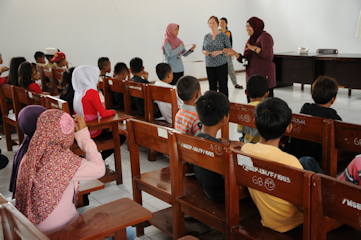
Dr. Mirta Teichberg and Mrs. Sainab Husain Paragay teaching school
children on Barrang Lompo (Photo: Sebastian Ferse, ZMT) |
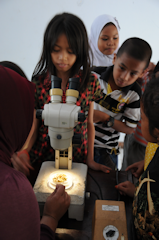
View through the microscope
(Photo: Sebastian Ferse, ZMT) |
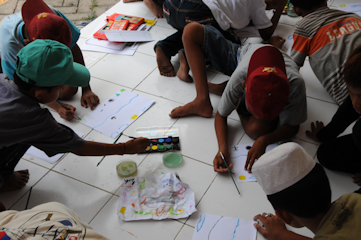
Schoolchildren paint what they associate with the coean
(Photo: Sebastian Ferse, ZMT) |

Fisherman (Artist: Fadli) |
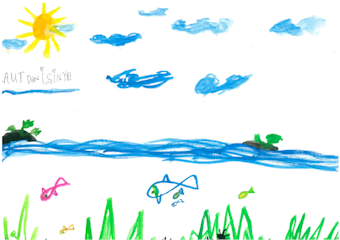
Ocean and its content (Artist: Rismawati) |
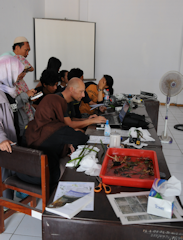
Dr. Dominik Kneer demonstrating a
field experiment
(Photo: Sebastian Ferse, ZMT) |
|
Social science workshop
Environmental governance approaches in the local context: Evidence from Indonesia
7-8 September 2015, ZMT
The governance and management of Indonesia's natural resources has been the subject of intense political and scientific debate over the past years. Political reforms since the late 1990s and the emergence of new governance approaches have affected the dynamics and modes of natural resource utilisation and management and posed new challenges. Notwithstanding these changes, persisting structures, actor constellations and modes of interaction as well as specific local contexts considerably determine the utilisation, control and management of natural resources. They shape the effects of political reforms and "new approaches" on the ground.
The workshop aimed to examine the different "tools" which are out there, reaching from state-led top-down approaches, state-initiated programmes with various forms of participation, community management, and NGO-facilitated governance to (supposedly) market-based instruments like Payments for Environmental Services, and to explore the effects of these approaches in the local or regional contexts.
The workshop provided an opportunity to bring the SPICE III social science findings from various sub-projects and related findings from other scholars together and create a platform for exchange.
The ZMT hosted workshop was attended by 10 participants, including Prof. Dr. Luky Adrianto (Center for Coastal and Marine Resources Studies, Bogor Agricultural University). Nearly all of the participants lectured, with topics ranging from the historical development of MPA legislation to tenure arrangements in Javanese lagoons, to experiments using payment incentives to deter forest degradation. We engaged in a lively evaluation of each participant's work, which was particularly enabled by the diversity of social science backgrounds present. Still, many of the papers presented were complementary; specifically, a theme surrounding local-level and community-oriented management arose, with many comparisons drawn between top-down versus bottom-up approaches to resource management. This was a welcome development in the workshop, as many of our participants have unique knowledge of local communities in Indonesia and thus elucidated scientific results through a context-specific lens.
CONTACT:
Jill Heyde artec Sustainability Research Center University of Bremen jill.heyde@uni-bremen.de
Prof. Dr. Achim Schlüter Social Systems & Ecological Economics Leibniz Center for Marine Tropical Ecology (ZMT) & School of Humanities and Social Sciences Jacobs University achim.schlueter@zmt-bremen.de
|
12th bilateral Steering Committee Meeting Earth and Ocean Sciences in Indonesia
19 August 2015
ZMT scientists recently attended the "12th Steering Committee Meeting in the Field of Earth and Ocean Sciences" together with partners from Germany and Indonesia.
The bilateral meeting was led by RD Karl Wollin, head of the Division "System Earth" of the Ministry of Education and Research (BMBF) and Nada Marsudi from the Indonesian Ministry of Research, Technology and Higher Education (RISTEKDIKTI), who was accompanied by Dr. Indra Sakti from the Ministry of Marine Affairs and Fisheries (KKP).
During the fruitful meeting Dr. Tim Jennerjahn (head of the Ecological Biogeochemistry workgroup at the ZMT) and program coordinator Dr. Claudia Schultz presented key research results of the SPICE III program.
The German delegation, accompanied by Michael Rottmann, Counsellor Science, Technology and Environment of the German Embassy in Jakarta, also visited the Jenderal Soedirman University (UNSOED) in Purwokerto and was joined by ZMT alumnus Dr. Erwin Riyanto Ardli, now Assistant Director of the International Relation Office at UNSOED. Afterwards, the group went on to see the Segara Anakan Lagoon in Cilacap, the location of some of the ZMT research. |
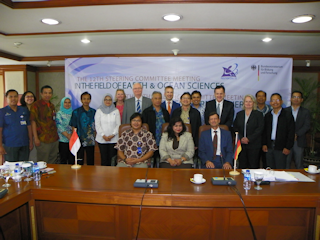 |
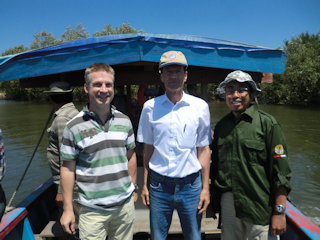 |
SIRTE Conference in Makassar
15-16 September 2015
More than 120 participants recently attended the conference "Small Islands Research in Tropical Regions - The Spermonde Archipelago and other Case Studies" (SIRTE) held in the Indonesian city of Makassar.
The two-day event, organised by the Leibniz Center for Tropical Marine Ecology (ZMT) together with the Hasanuddin University Makassar, brought together researchers from Indonesia, the Netherlands, New Zealand, Australia, USA, Japan, Belgium and Germany.
The conference was deemed a great success by participants and organizers alike in providing a great forum for discussions, networking and food for thought among the researchers. One of the main talking points, which were also referenced in many of the talks, was the transfer of research results into practical application.
For more information please visit the website: http://sirtre2015.zmt-bremen.com/ The conference was conducted in the context of the SPICE III project MaCoRAS Understanding and Managing the Resilience of Coral Reefs and Associated Social Systems (Topic 3).
Direct contact: Dr. Hauke Reuter (hauke.reuter@zmt-bremen.de)
|
Sustainable Marine Areas Between resource use and conservation, the example Savu Sea
Workshop in Kupang 4-6 May 2015
The MPA Savu Sea belongs to the largest protected areas in the world and has been established in 2009 under the management status of a Marine National Park (Taman Nasional Perairan (TNP)) by the Indonesian Government on the World Ocean Conference in Manado.
The Savu TNP covers many different ecological habitats in a region with a very high biodiversity and worldwide importance for key species (e.g. marine mammals, turtles). The current implementation and management progress aims at combining areas with high conservation status with zones of different use to sustain local livelihoods. This is a complex task involving many different stakeholders from governmental institutions, NGOs and local communities with different interests.
The aim of the workshop was to convey an overview on the progress of the implementation process of Savu TNP and highlight success stories as well as regional differences and also potential obstacles and impediments. Its specific objective was to exchange experiences with stakeholders from the entire region, including representatives from the government, provincial administration, communities, NGOs and Universities (esp. fisheries departments), on progress and hurdles in the MPA establishment process.
The workshop was organized in cooperation with the Marine Conservation Council, University Consortium and TNC.
The mixture of conference, lectures and discussions with students, lecturers and scientists as well as the boat excursion was a good contribution to capacity building as well as exchanging the stories of success and failure (discussing the challenges) in the local MPA establishment process.
Contact: Hauke Reuter (hauke.reuter@zmt-bremen.de) |
ZMT presents marine research cooperation with Indonesia to Foreign Minister Steinmeier
From 1 to 3 November, Foreign Minister Frank-Walter Steinmeier visited Indonesia. During a boat trip on the Bay of Jakarta last Sunday, ZMT scientist Tim Jennerjahn had the opportunity to present the bilateral research activities to the Minister and to a delegation of the German Parliament.
In Jakarta the Foreign Minister held talks with the new president of the country, Joko Widodo, and his Indonesian counterpart Retno Marsudi. The topics included the implementation and advancement of the "Jakarta Declaration" signed in 2012, which raised German-Indonesian relations to a strategic partnership and intensified cooperation in various fields including trade, healthcare, science, technology and education.
The research relations between the ZMT and Indonesia date back to the 1990s. The SPICE Program is a main pillar in which since 2003 German and Indonesian researchers have been studying the scientific, social and economic aspects of the protection and exploitation of Indonesian coastal ecosystems and their resources.

Foto: Ulrich Mohr
|
International SPICE III Topic 1 & 4 Workshop, Purwokerto
29-30 September 2014
International SPICE III Topic 1 & 4 Workshop, Purwokerto, September 29-30, 2014 On September 29 and 30, 2014, an "International SPICE III Topic 1 & 4 Workshop" was hosted by the Jenderal Soedirman University (UNSOED) in Purwokerto, Java, where Topic 4 is based. It was the first time in the 10-year history of SPICE that a workshop of more than one topic was conducted.
The two-day workshop with more than 50 participants was opened by the Vice-Rector of UNSOED, a representative of the Indonesian Ministry of Research and Technology (RISTEK) and the Science Counsellor of the German Embassy.
The audience saw a large number of exciting topical talks given by researchers and students active in Topic 1 "Impact of Marine Pollution on Biodiversity and Coastal Livelihoods" and Topic 4 "Terrestrial Influences on Mangrove Ecology and Sustainability of Their Resources". These were complemented by lectures of researchers from institutions not yet collaborating with the SPICE community, but thematically related to SPICE.
As Capacity Building is a major component of SPICE, students presented their projects conducted or planned in the frame of SPICE and the long-term lecturer of the German Academic Exchange Service (DAAD) outlined career opportunities in Germany and funding schemes of the DAAD.
The lectures and lively discussions during breaks and the conference dinner warranted an intensive exchange of latest research results between Topics and provided students of both countries with the opportunity to discuss with the participating researchers.
In this context, an already accepted outline for a special issue on "Environmental Problems of Jakarta Bay" (Topic 1) of the international journal Marine Pollution Bulletin was presented. Thanks to the workshop, also non-SPICE scientists from BPPT and LIPI will contribute to it.
Resulting from the successful long-term collaboration UNSOED and ZMT established a joint field station, the "International Tropical Marine and Earth Science Laboratory (ITMEL)", which is in operation since 2012 and forms part of the worldwide infrastructure network of the Leibniz Association's collaborative on Biodiversity (www.leibniz-verbund-biodiversitaet.de/index.php?id=866#top). At the end of the workshop a scientific concept was presented in order to maintain the collaboration after the end of SPICE with the help of ITMEL.
Following the long-term strategy of ZMT to tackle global scale issues like, for example, mangrove degradation, carbon sequestration potential, loss of biodiversity, watershed governance and coastal livelihoods through long-term data series and a large scale comparative approach this concept foresees to collect respective information on the Segara Anakan Lagoon and its watershed. It will be led by UNSOED and ZMT, but is open to be joined by other institutions and researchers. In such a way this transregional workshop contributed to an overall synthesis of SPICE research and paved the way for a successful future bilateral collaboration.
|
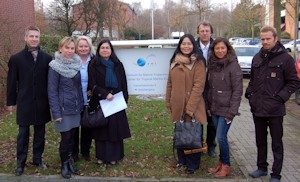 |
The Indonesian Consul General visited ZMT
15 January 2014
The Indonesian Consul General Marina Estella Anwar Bey visited ZMT. The meeting was focused on the SPICE III Program and the bilateral research cooperation with Indonesia. |
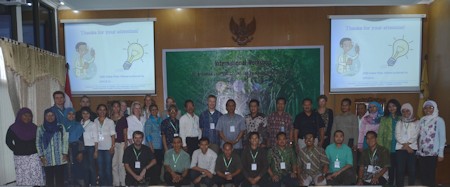 |
International Workshop on 10 years of collaboration
27-28 November 2013
The success of 10 years of collaboration between UNSOED and ZMT in the frame of the SPICE Program was celebrated during a workshop at the Jenderal Soedirman University (UNSOED) in Purwokerto.
The workshop highlighted the successful scientific cooperation in the Segara Anakan Lagoon and was focused on the important ecosystem functions and services of the mangrove forests as a feeding and nursery ground for fish, shrimp and mud crabs, for coastal protection, as carbon sink, and as food and income source for local communities and national economies.
Researchers, students and stakeholders from the Segara Anakan region and collaborating scientists from the SPICE Program participated in this workshop.
|
Opening of a joint field station in Purwokerto
28 November 2013
As a result of the long-ongoing cooperation between ZMT and the Jenderal Soedirman University (UNSOED) a joint research station was opened in Purwokerto.
The “International Tropical Marine and Earth Science Laboratory“(ITMEL) allows biological and biogeochemical short and long-term lab studies and offers an ideal frame for lectures, workshops and practical trainings.
ZMT and UNSOED are cooperating since the beginning of the SPICE Program in 2003 focusing on the mangrove ecosystem research in the Segara Anakan Lagoon.
The joint laboratory will be open to other collaborating institutions in Indonesia and Germany. This field station also forms part of the network of international field stations run by the Biodiversity Cluster of the Leibniz Association in Germany.
For more information please visit:
http://www.leibniz-verbund-biodiversitaet.de
|
 |
 |
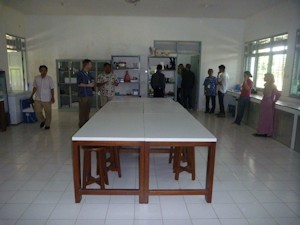 |
Kickoff-Meeting Bremen
22-24 May 2012
The bilateral SPICE III community met in Bremen. The meeting and scientific workshop was held from 22nd to 24th May 2012 at the Leibniz-Center for Tropical Marine Ecosystems (ZMT).
The cooperating partners concretized the actual stages of the planned SPICE III research and the related operational planning.
 Download Agenda Download Agenda

Chancellor meets ZMT scientists in Indonesia
11 July 2012
In the course of her state visit to Indonesia, the German Chancellor Angela Merkel has visited the Tsunami Early Warning Center in Jakarta on 11th July 2012 to read up about the German-Indonesian scientific and technological cooperation. In frame of her visit ZMT informed about the bilateral marine research and introduced the SPICE Program.

|
Signing ceremony
11 July 2012
Referring to the state visit the bilateral SPICE III framework agreements for the third phase of the program were signed by the overall coordinators Prof. Hari Eko Irianto and Dr. Claudia Schultz.
Prof. Amin Soebandrio, (Vize Minister Research and Technology, RISTEK) and Dr. Gelwynn Yusuf (Chairman of the Agency for Marine Affairs and Fisheries Research and Development, KKP) attendant the signing ceremony.
|
|

